Our verdict
Pros
- Comfy all-day
- Great value
- Wide toebox
- Good for walking & gym
- Perfect for beginners and heel strikers
- Lightweight
- Durable outsole
- Well-cushioned sockliner
Cons
- Firm midsole
- Limited vertical room in the toebox
- Low forefoot cushioning
Audience verdict
Comparison
The most similar running shoes compared
+ + Add a shoe | |||||
|---|---|---|---|---|---|
| Audience score | 79 Good! | 85 Good! | 77 Decent! | 81 Good! | |
| Price | $70 | $65 | $75 | $75 | |
| Pace | Daily running | Daily running | Daily running | Daily running | |
| Shock absorption | - | Moderate | Moderate | Low | |
| Energy return | - | Low | Low | Low | |
| Traction | - | Low | Moderate | Moderate | |
| Arch support | Neutral | Neutral | Neutral | Neutral | |
| Weight lab Weight brand | 9.3 oz / 264g 10 oz / 283g | 9.7 oz / 275g 10.7 oz / 303g | 9.3 oz / 265g 9.4 oz / 267g | 10.5 oz / 298g 9.9 oz / 280g | |
| Drop lab Drop brand | 9.6 mm 8.0 mm | 9.4 mm 10.0 mm | 10.1 mm 10.0 mm | 9.4 mm 10.0 mm | |
| Strike pattern | HeelMid/forefoot | HeelMid/forefoot | Heel | HeelMid/forefoot | |
| Size | Slightly small | True to size | Slightly small | Slightly small | |
| Midsole softness | Balanced | Balanced | Balanced | Firm | |
| Difference in midsole softness in cold | Normal | Small | Small | Small | |
| Toebox durability | Decent | Bad | Decent | Bad | |
| Heel padding durability | Bad | Bad | Good | Bad | |
| Outsole durability | Decent | Decent | Good | - | |
| Breathability | Moderate | Moderate | Moderate | Moderate | |
| Width / fit | Medium | Wide | Medium | Medium | |
| Toebox width | Wide | Medium | Medium | Medium | |
| Stiffness | Moderate | Moderate | Moderate | Moderate | |
| Torsional rigidity | Moderate | Flexible | Moderate | Moderate | |
| Heel counter stiffness | Moderate | Moderate | Moderate | Moderate | |
| Heel lab Heel brand | 30.8 mm 30.0 mm | 31.2 mm 33.0 mm | 32.2 mm 32.0 mm | 32.0 mm | |
| Forefoot lab Forefoot brand | 21.2 mm 22.0 mm | 21.8 mm 23.0 mm | 22.1 mm 22.0 mm | 22.6 mm | |
| Widths available | NormalX-Wide | NormalWide | NarrowNormalWideX-Wide | NormalWideX-Wide | |
| Orthotic friendly | ✓ | ✓ | ✓ | ✓ | |
| Season | All seasons | All seasons | All seasons | All seasons | |
| Removable insole | ✓ | ✓ | ✓ | ✓ | |
| Ranking | #338 Bottom 11% | #206 Bottom 46% | #351 Bottom 8% | #300 Bottom 21% | |
| Popularity | #292 Bottom 23% | #113 Top 30% | #57 Top 15% | #100 Top 27% |
Who should buy
We recommend the Under Armour Charged Pursuit 3 for:
- Under Armour fans seeking a budget-friendly shoe that transitions effortlessly between casual wear and easy runs.
- Runners who appreciate a flexible, wide-foot-friendly design that delivers affordability without sacrificing comfort.
- Beginners prioritizing simplicity and versatility in a lightweight daily trainer.

Who should NOT buy
We believe the Charged Pursuit 3 is not ideal for runners seeking a soft, plush experience. Its firm midsole, combined with a thick outsole, creates a ride that feels almost like running on steel. For a smoother, more forgiving underfoot feel, we recommend the Nike Winflo 11, which offers significantly softer cushioning. Or the Winflo 11 GTX for a winter-ready, water-resistant choice.
This model also falls short for fans of high-stack running shoes. With just over 20 mm in the forefoot, it lacks the plush cushioning many modern runners expect. In our view, the Saucony Axon 3 is a far better option for those seeking a higher-stacked, affordable alternative.

Cushioning
Heel stack
Under Armour achieved a good reduction in this shoe’s weight, creating a lighter sensation that we appreciated during our runs. However, this is partly due to its 30.8 mm heel stack height—significantly lower than the lab-tested average for similar models.
In our opinion, this design caters to runners who like ground feel or those with minimal cushioning needs, such as many women. It’s also an excellent choice for anyone drawn to a classic ride, evoking the feedback-rich experience of shoes from five or more years ago.

| Charged Pursuit 3 | 30.8 mm |
| Average | 34.8 mm |
Forefoot stack
Everything we mentioned about the heel applies even more to the forefoot, which measures just 21.2 mm. This keeps you remarkably close to the ground, delivering exceptional ground feel—especially noticeable during faster-paced runs.
That said, the firm foam chosen by Under Armour prevents the shoe from bottoming out and limits ground feel.
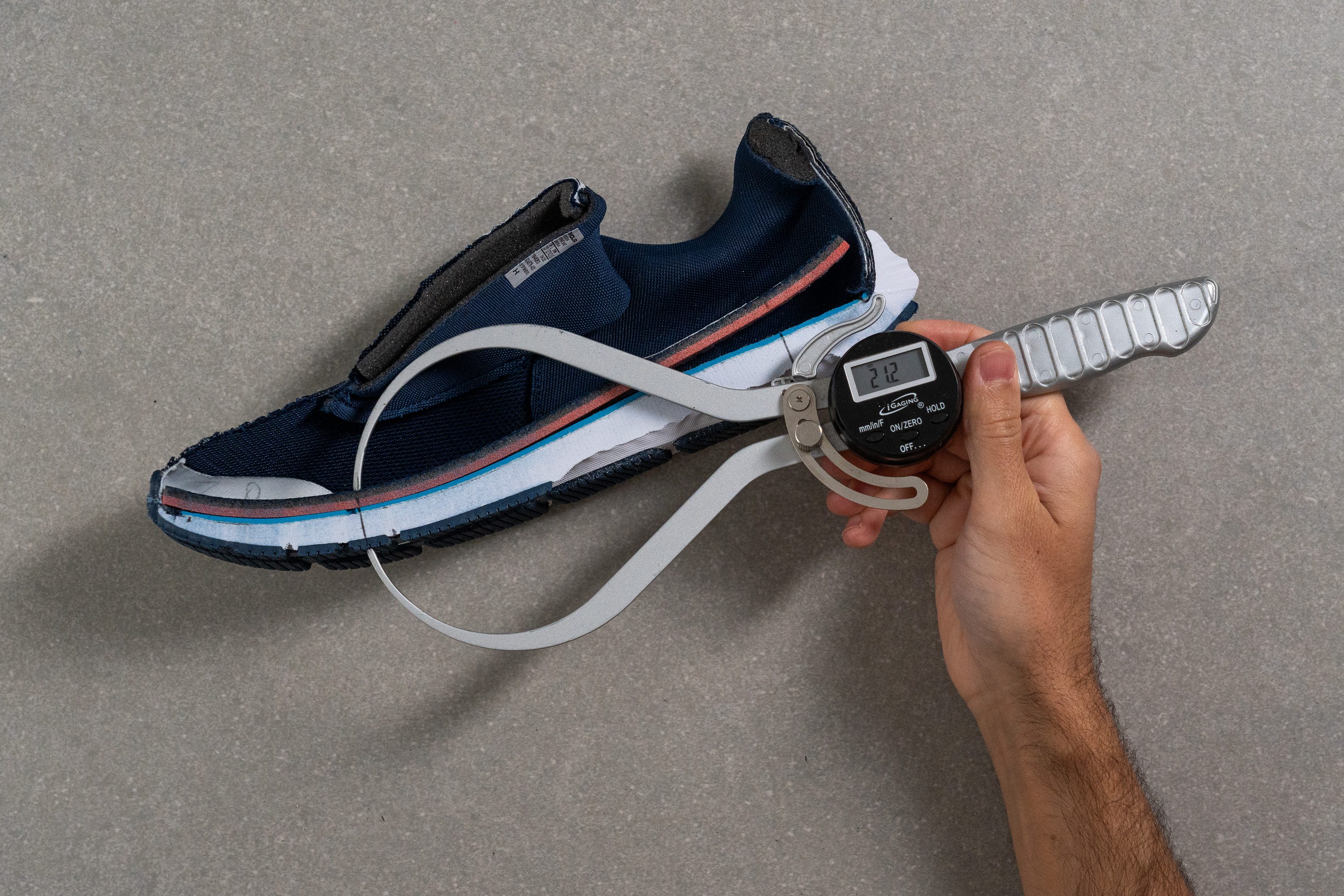
| Charged Pursuit 3 | 21.2 mm |
| Average | 26.2 mm |
Drop
This no-frills, budget-friendly daily trainer sticks to the classic formula—a high heel-to-toe drop.
While UA claims 8 mm for the Charged Pursuit 3, our measurement showed 9.6 mm, with no noticeable impact on its overall feel.
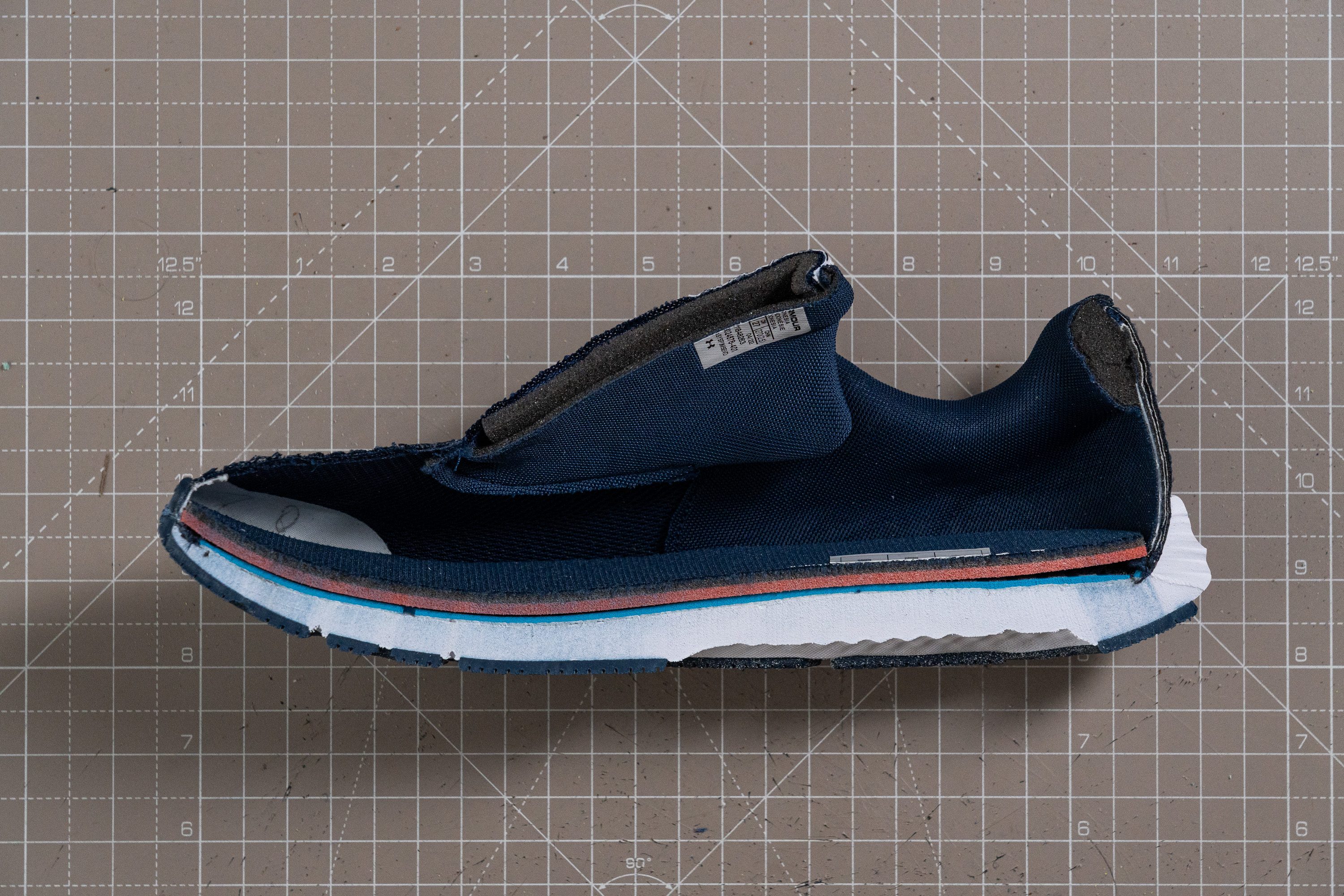
| Charged Pursuit 3 | 9.6 mm |
| Average | 8.6 mm |
Midsole softness
The Charged Cushioning foam felt noticeably firm during our runs and our durometer said exactly the same with a 29.5 HA reading. This feature might deter those who prefer softer, cushioned landings in their daily trainers.
For this reason, we’re convinced that if you favor a soft, cloud-like feel underfoot, the Charged Pursuit 3 won’t meet your expectations—it’s positioned on the opposite end of the plush spectrum.

| Charged Pursuit 3 | 29.5 HA |
| Average | 20.4 HA |
Rocker
The heel incorporates a slight angle, which we found to be particularly advantageous for runners who heavily rely on heel strikes.
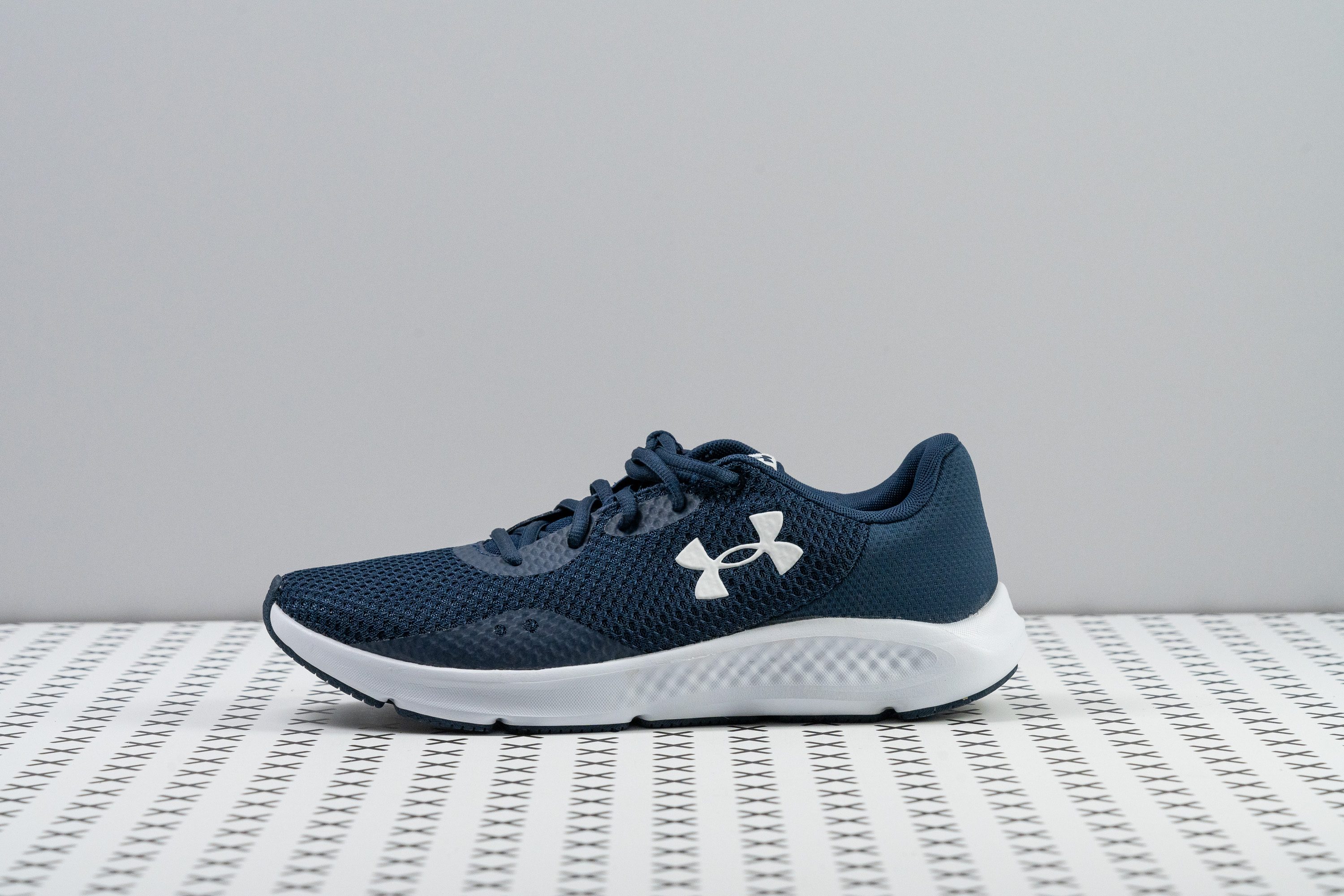
We also found that Under Armour played it safe with the forefoot rocker design, as we found it strikingly similar to most daily trainers—a subtle, non-intrusive curvature that feels natural for walking and aids slightly in turnover.
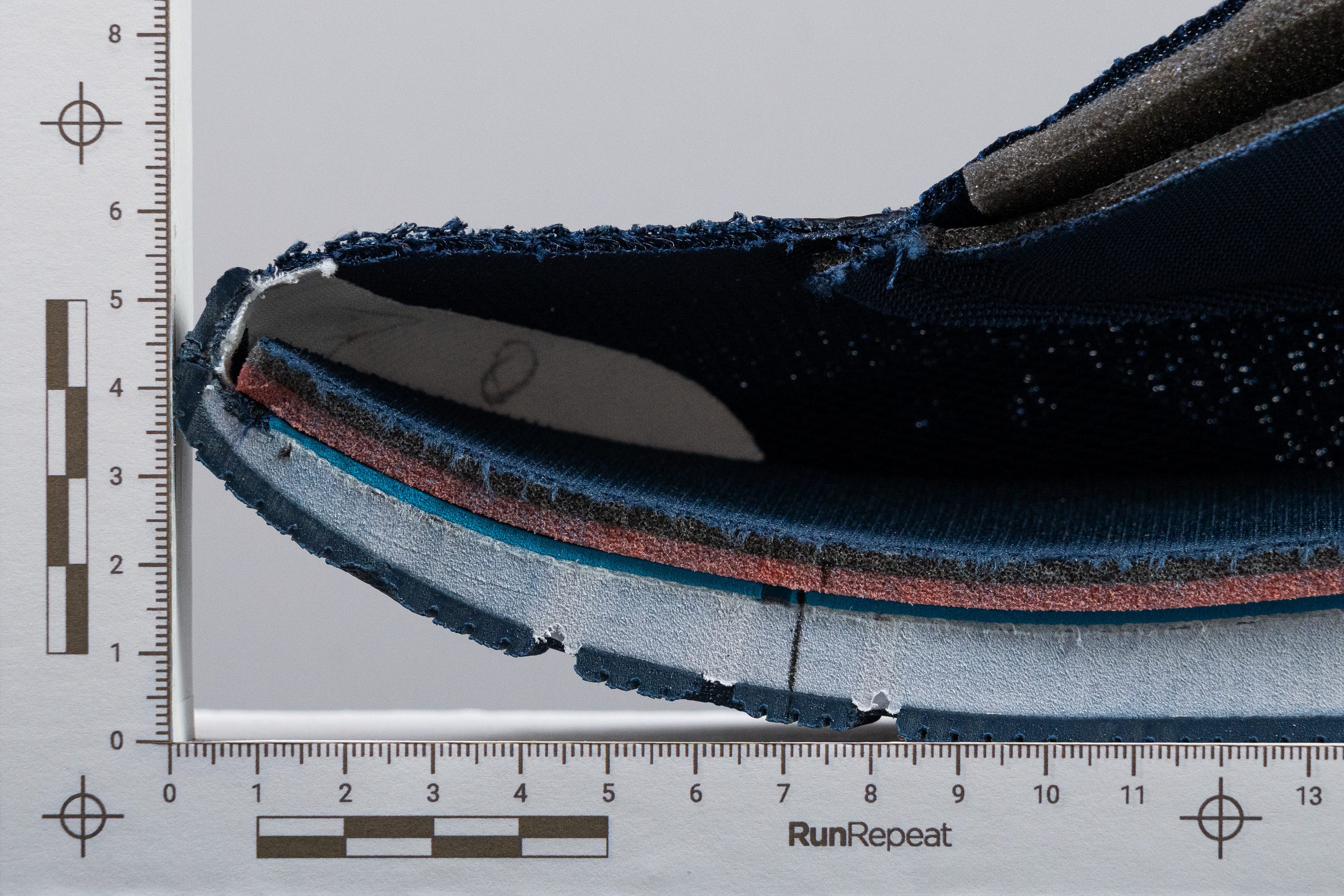
Size and fit
Size
Under Armour Charged Pursuit 3 fits slightly small (70 votes).
Internal length
| Charged Pursuit 3 | 268.0 mm |
| Average | 269.4 mm |
Width / Fit
Right away, the Charged Pursuit 3 stood out with its broader-than-average fit, offering an unexpected roomy experience. After testing with our digital calipers, we confirmed the width at an impressive 100.9 mm—surpassing most daily trainers.

This test follows an older methodology, which is why you don't see recently tested shoes in the chart. Results from different methodologies can not be compared.
| Charged Pursuit 3 | 100.9 mm |
| Average | 98.5 mm |
Toebox width
The Charged Pursuit 3 felt a bit limited in vertical room, and in our experience, those who enjoy a flexible, free-moving toe box might find this upper slightly constrictive for upward toe movement.
When it comes to horizontal splay, however, we discovered a good performance. We measured the toebox at 79.8 mm, confirming its slightly-roomy fit—ideal for runners seeking comfortable, natural toe spread in a cheap trainer.
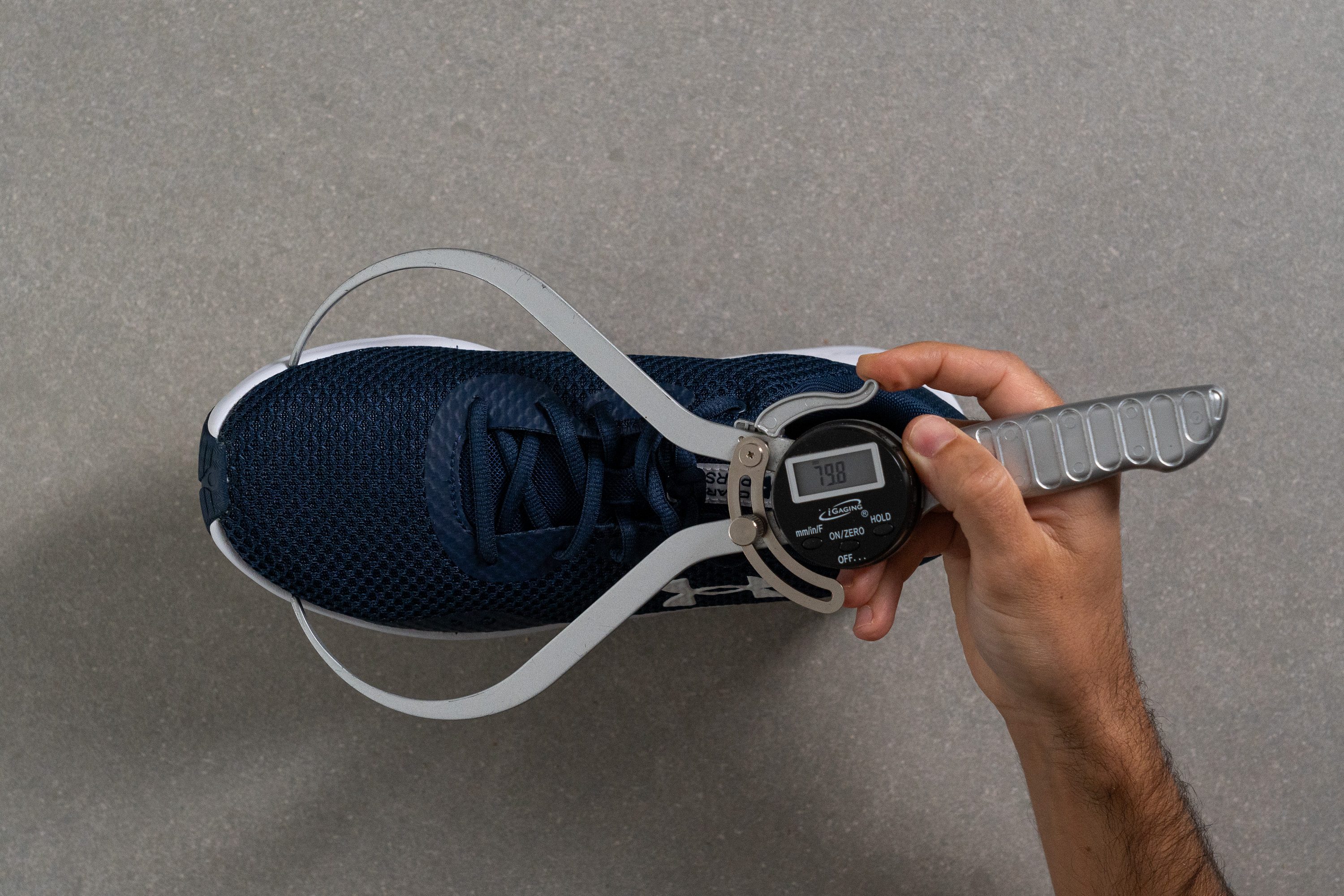
This test follows an older methodology, which is why you don't see recently tested shoes in the chart. Results from different methodologies can not be compared.
| Charged Pursuit 3 | 79.8 mm |
| Average | 78.4 mm |
Flexibility / Stiffness
A common feature of budget-friendly running shoes is their versatility—they’re designed to handle various activities beyond running, like walking or gym workouts. To achieve this, they require impressive flexibility; otherwise, comfort would take a hit.
After testing the Charged Pursuit 3 with our 90-degree bend assessment, we found it remarkably flexible, measuring an easy-bending 15.9N.
This test follows an older methodology, which is why you don't see recently tested shoes in the chart. Results from different methodologies can not be compared.
| Charged Pursuit 3 | 15.9N |
| Average | 28.1N |
Weight
We found that Under Armour did a commendable job keeping the shoe under 10 oz—specifically at 9.3 oz or 264g. The low-cushioned midsole undoubtedly contributes, but we still think that this is a solid feature of the Charged Pursuit 3.
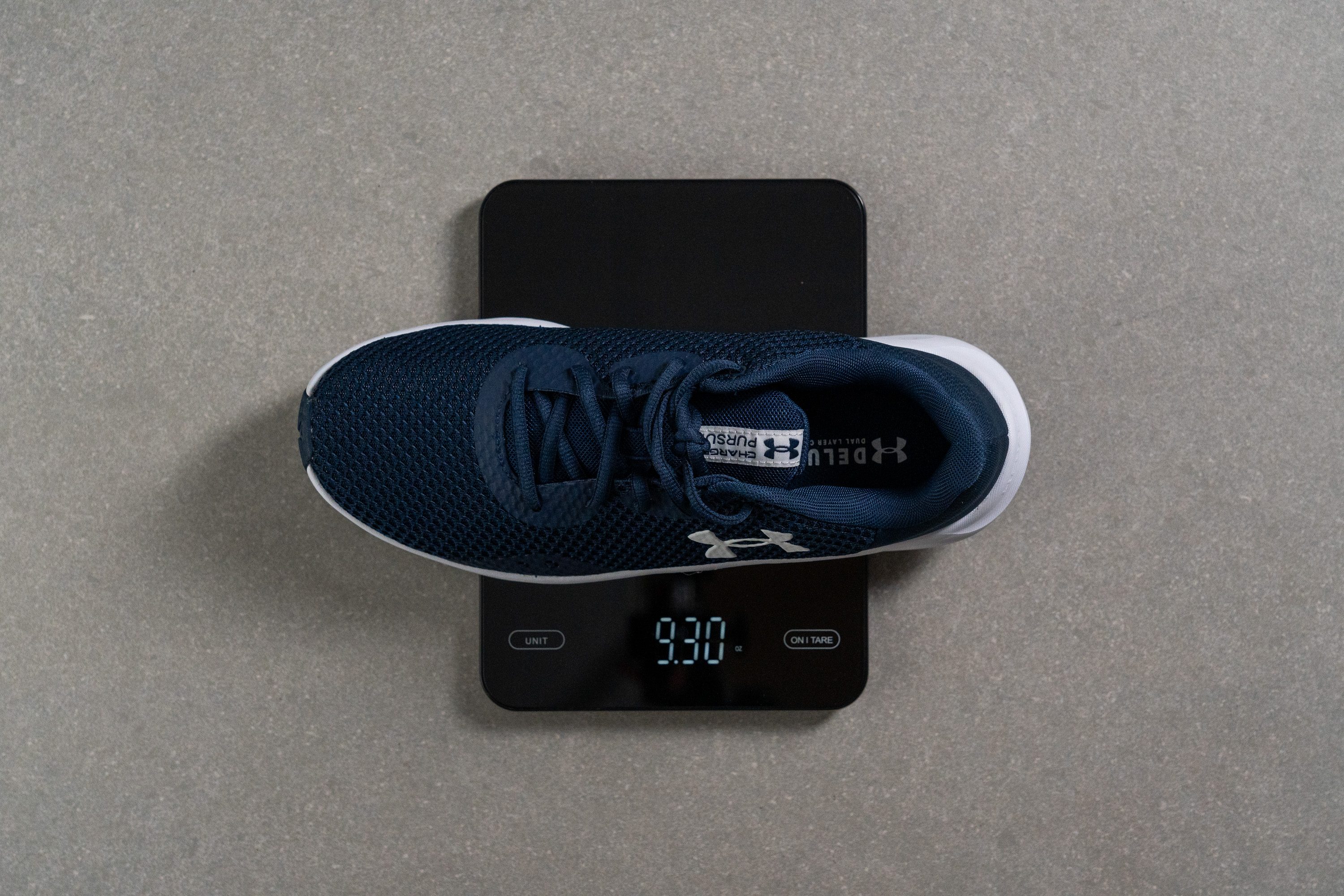
| Charged Pursuit 3 | 9.3 oz (264g) |
| Average | 9.3 oz (264g) |
Breathability
We found that our signature smoke test yielded a moderate result, scoring 3 out of 5. The Charged Pursuit 3 struggled a bit to clear as much smoke as we anticipated, hinting at potential challenges in extreme heat—especially with the dark blue colorway, which could exacerbate the issue. However, in our opinion, it should perform adequately in most other weather conditions.
When we examined the engineered mesh with a light, we noticed breathability spread across most of the upper. Still, each hole in the mesh lacked top-notch airflow, and this situation underscores the importance of doing multiple tests to fully understand ventilation on each shoe.
Through our microscope inspection, we found the culprit. Rather than leaving spaces bare between the thicker yarns—common in other daily trainers—Under Armour added a secondary layer beneath the main mesh, visible in the darker blue color.

This layer, likely intended to enhance durability and structure, adds a sturdy touch to the upper.

We believe that for a shoe at this price point, the upper is a good one, with materials that could rival those of pricier $100 models. The heel and tongue cushioning also provides a nice step-in feel, balancing comfort with price.
| Charged Pursuit 3 | 3 |
| Average | 3.7 |
Stability
Lateral stability test
We found that the UA Charged Pursuit 3 performs well for neutral runners but doesn’t excel in stability at all. For those seeking an affordable Under Armour option with a more balanced, supportive feel underfoot, the Charged Assert 10 is a smarter choice.
Torsional rigidity
From the start, we found that Under Armour played it safe with the design, focusing on creating a solid, no-nonsense daily trainer. This approach aligns perfectly with the 3/5 torsional rigidity score.
| Charged Pursuit 3 | 3 |
| Average | 3.5 |
Heel counter stiffness
The heel counter delivered a balanced feel too—not overly firm nor overly pliable, but comfortably in the middle. Obviously, that means another 3 out of 5.
| Charged Pursuit 3 | 3 |
| Average | 2.9 |
Midsole width - forefoot
We picked up our digital calipers again to measure the midsole dimensions. In the forefoot, we discovered a max width of 110.3 mm—a slightly narrow design that, in our view, aligns well with its appeal for neutral runners.

| Charged Pursuit 3 | 110.3 mm |
| Average | 114.4 mm |
Midsole width - heel
Unsurprisingly, we felt the same vibe from the heel, which even aligns more closely with the average dimensions we usually see. The reason is clear—this is a beginner-friendly shoe, and therefore, is specifically tailored to accommodate heel strikers!
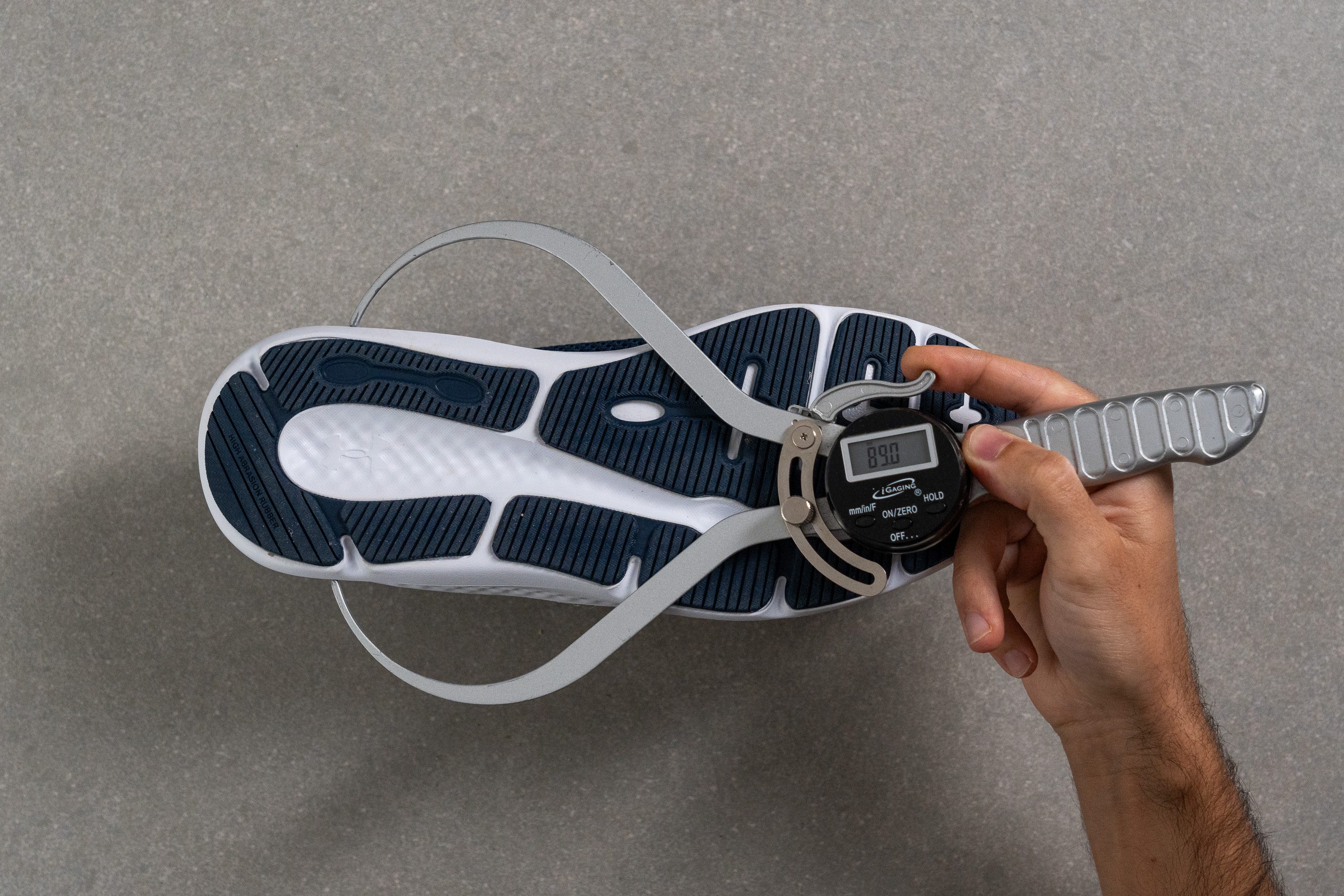
| Charged Pursuit 3 | 89.0 mm |
| Average | 90.6 mm |
Durability
Toebox durability
We used our Dremel to replicate extreme wear on this Under Armour model, applying 3.2N of abrasive force at 5K RPM. Despite the inclusion of a secondary layer, we discovered durability was underwhelming, scoring a modest 2/5.
| Charged Pursuit 3 | 2 |
| Average | 2.6 |
Heel padding durability
Unfortunately, the heel padding area performed even worse, earning a disappointing 1/5. This poses significant issues for runners prone to heel wear, making a more durable option like the ASICS Gel Excite 10 worth considering.
| Charged Pursuit 3 | 1 |
| Average | 3.4 |
Outsole hardness
After two disappointing durability tests in the heel and toebox, we were hoping for a more promising result in the outsole—arguably the most critical area for durability in budget-friendly shoes, especially for heel strikers.

We began by assessing the outsole hardness using our Shore C durometer. The measurement came in at 84.3 HC, a result we’ve often seen in affordable models. In our experience, this harder rubber is a common choice to enhance durability, though it tends to prioritize toughness over grip, leaving traction as a secondary consideration.

| Charged Pursuit 3 | 84.3 HC |
| Average | 79.2 HC |
Outsole durability
In our experience, the firmer rubber proved effective, delivering a positive result in our durability test with only 1.0 mm of wear on the outsole. It’s not outstanding, but this solid performance should handle regular use.
| Charged Pursuit 3 | 1.0 mm |
| Average | 1.1 mm |
Outsole thickness
The promising durability of the outsole stems from its exceptionally thick 4 mm layer of rubber—a double-edged sword. While it ensures excellent wear resistance, it also makes the ride even firmer, almost uncomfortably brick-like.

| Charged Pursuit 3 | 4.0 mm |
| Average | 3.2 mm |
Misc
Insole thickness
The insole stands out compared to what we typically encounter in budget-friendly running shoes, featuring a dual-layer construction and an impressive 5.3 mm thickness.
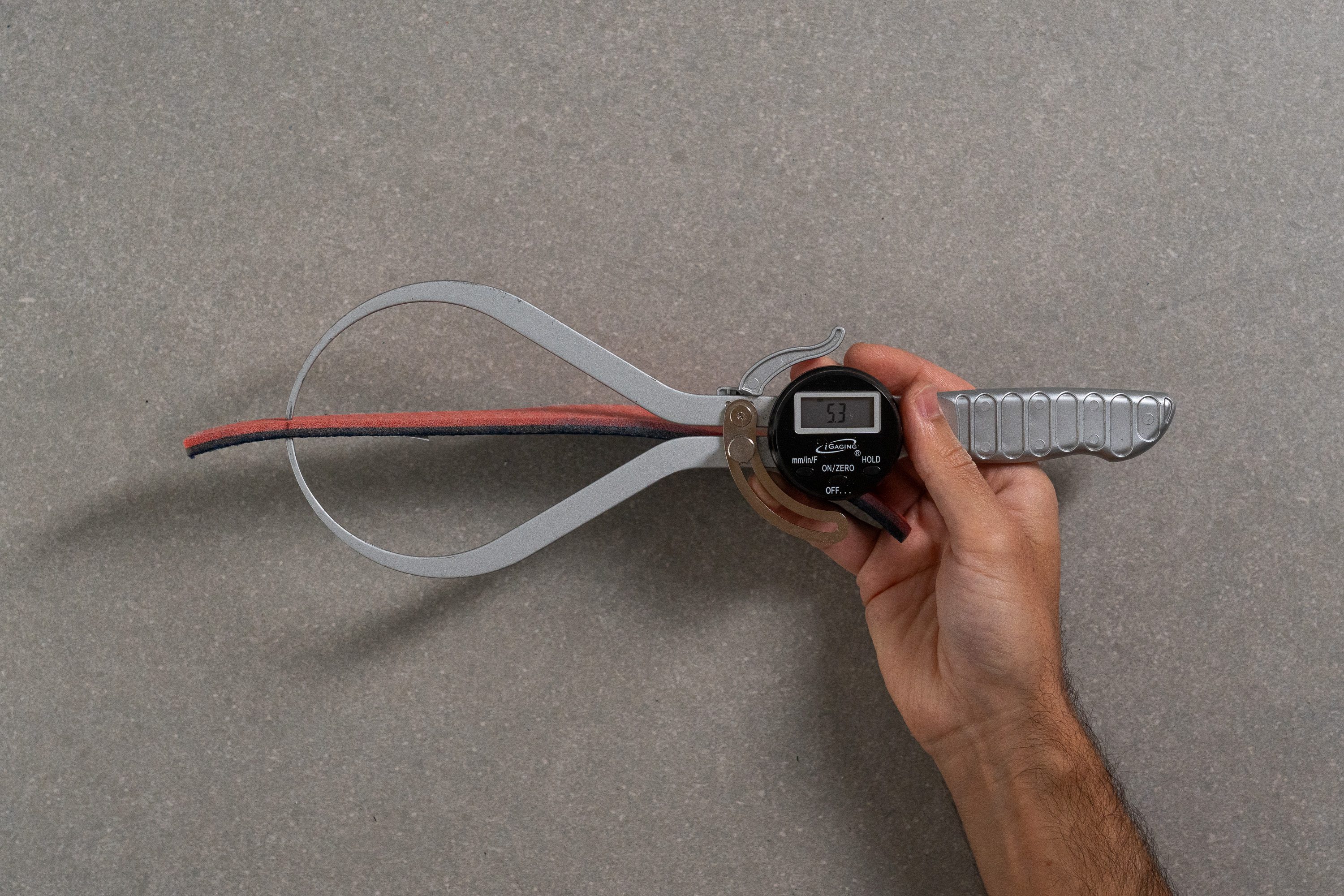
| Charged Pursuit 3 | 5.3 mm |
| Average | 4.5 mm |
Removable insole
If you’re looking to create extra room in the toebox, swapping the Deluxe Foam sockliner for a thinner alternative is a simple solution—it’s not glued to the midsole.
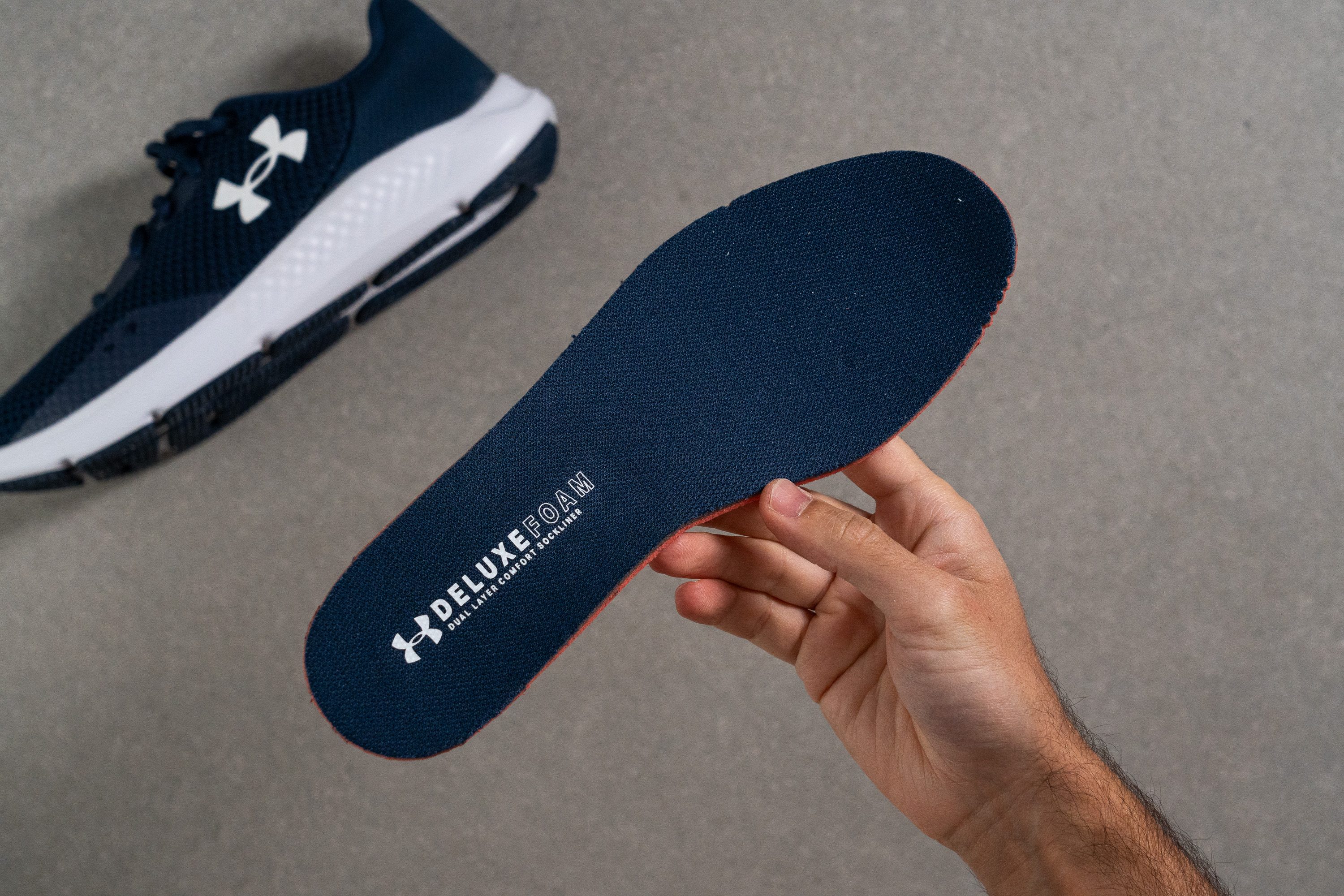
| Charged Pursuit 3 | Yes |
Midsole softness in cold (%)
The Charged Cushioning midsole is constructed from compression-molded EVA foam, which, in our experience here in the lab, often gets firm like a brick in cold conditions. And after testing, this shoe is no exception to that pattern.
We found that after just 20 minutes in the freezer, the durometer reading skyrocketed to a staggering 40.0 HA—a 35.6% increase from the previous room-temperature result.
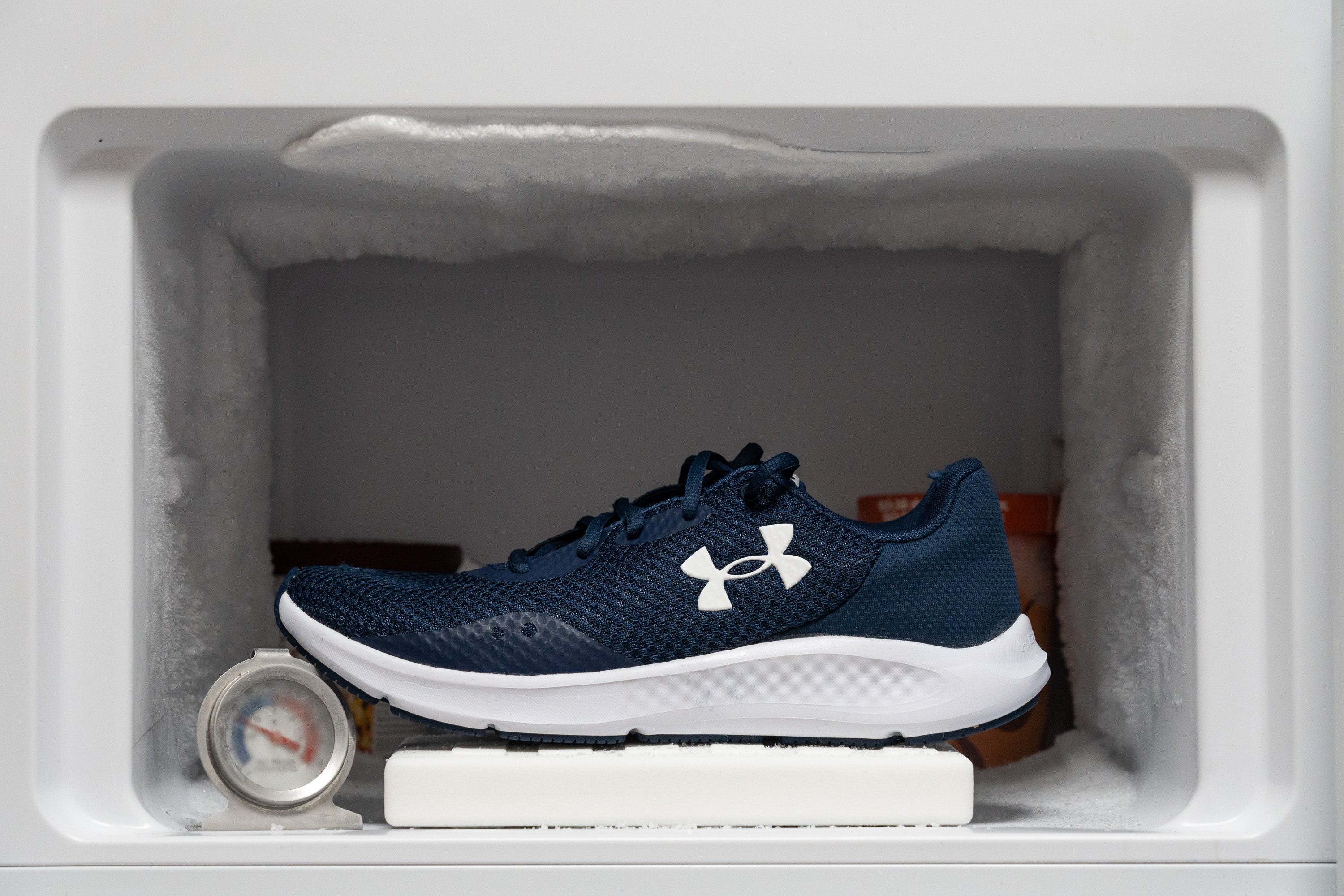
| Charged Pursuit 3 | 36% |
| Average | 24% |
Reflective elements
It would’ve been a nice touch, but this shoe lacks any reflective elements.

| Charged Pursuit 3 | No |
Tongue padding
One of the simplest and most cost-effective ways to enhance a shoe's comfort is by adding a thick foam layer in the tongue—a strategy Under Armour used here.

We measured a whopping 9.6 mm of plush foam, creating a super soft step-in feel from the very first run. In our experience, it might even verge on excessive!
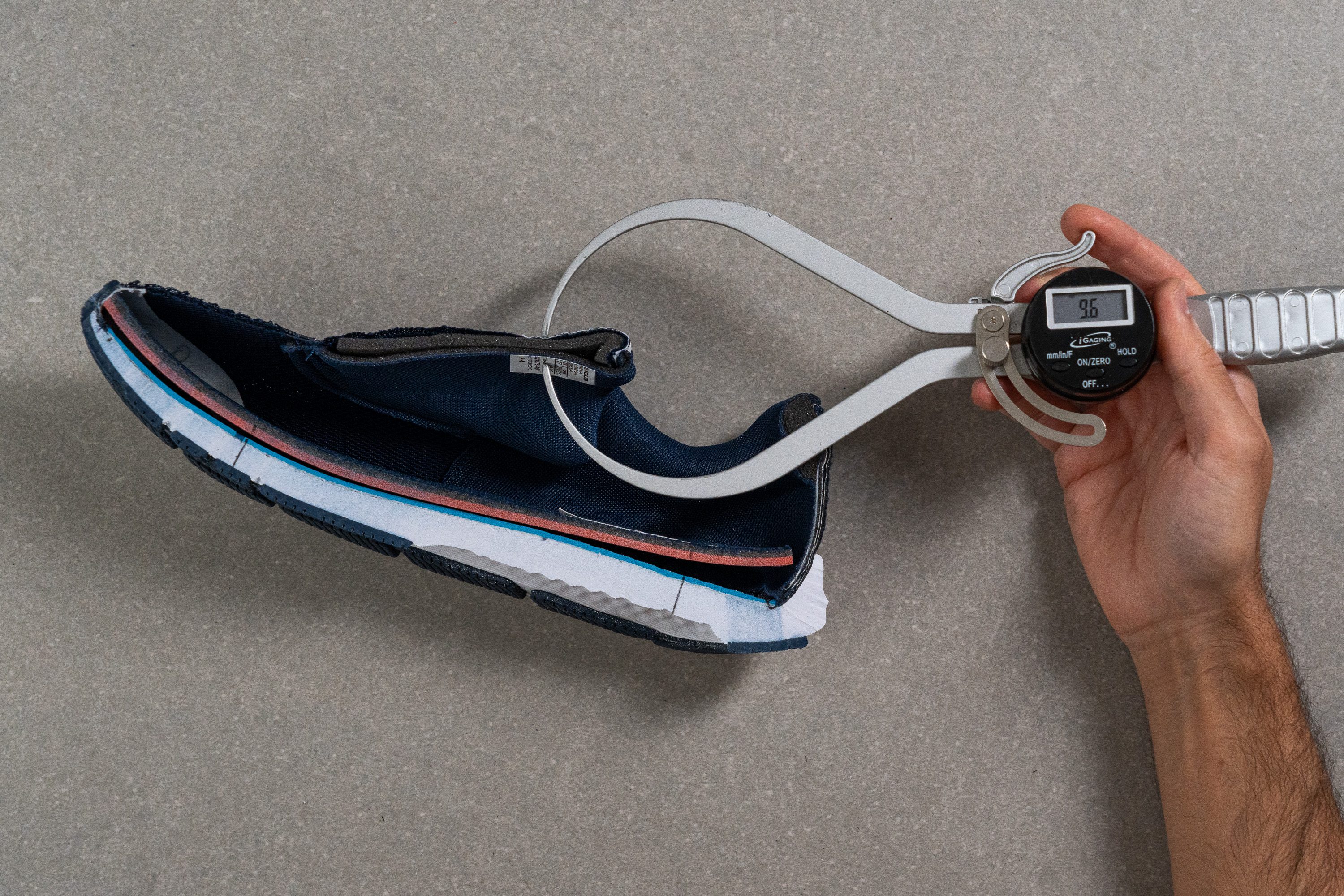
| Charged Pursuit 3 | 9.6 mm |
| Average | 5.7 mm |
Tongue: gusset type
The tongue isn’t secured to the sides—a feature typically found in shoes priced above $100. And that's not the case of the Charged Pursuit 3.

| Charged Pursuit 3 | None |
Heel tab
The Charged Pursuit 3 lacks a heel tab—a detail often omitted in budget-friendly designs to keep costs down. That's not a problem for us, but in our view, the entire heel area feels boring, with a dull and budget-basic appearance.

| Charged Pursuit 3 | None |
Price
The Charged Pursuit 3 is priced on the lower end of the market and, in our experience, is very reasonable. While it lacks premium features and delivers a firm ride, we believe it offers solid value for the price.
| Charged Pursuit 3 | $70 |
| Average | $153 |














































